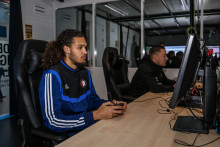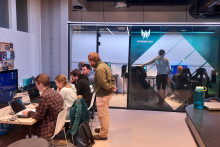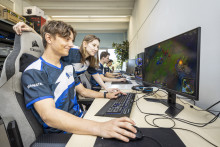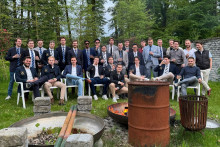Guido Bruinsma is researcher on this topic, both at the UT and Saxion. ‘We use both classical pen and paper psychological testing and technology such as eye tracking, skin conductance, reaction testing and emotion recognition software to test the players on different levels.’ Hence the presence of four professional FIFA players from Dutch football clubs Heracles Almelo and Feyenoord Rotterdam. ‘These types of testing are relevant within the context of FIFA since it is an individual esport. If we were to look at other esports such as League of Legends, we would also have to consider group dynamics and team tactics, which is something we also want to start testing in the long run.’
Player profiles
Bruinsma indicates that there is interest in the evidence-based analyses of esports. For him, that was reason to experiment. ‘We want to pioneer and contribute in this specific field of science and sports by building new facilities and developing new methods of analyses, just like it is already being done in ‘regular’ sports,’ says the BMS researcher. ‘In the future we want to start looking at player profiles, their tactical thinking and how their personality translates to in-game play styles. The goal being to measure everything we can measure and use this data to build a comprehensive player profile of strengths, weaknesses and tendencies players may have both inside and outside of the game. The level of competition is high in esports and players invest thousands of hours in their game. Both parties benefit from this collaboration: we get data on what makes a professional player and our partners get data on what aspects they might improve upon.’

Tactical thinking
Daniel Sitbahadoer is a volunteer that arranges the technical stuff and comes up with quick fixes at Gamelab Oost, in which Bruinsma is also involved. ‘When Guido Bruinsma contacted me, I was immediately on board. I am a motivated Rainbow Six Siege player and occasionally play Rocket League, once you get into these games, you really appreciate the level of mechanical skill and tactical thinking that high level players bring to their game and you develop an understanding as to why people watch these sports.’
‘Currently we are looking at ways to improve on the now seemingly still limited setup that we utilize. That a more realistic setup could help with getting more accurate results on measurements such as stress or emotion recognition could be done by hosting a tournament for the players while measuring their responses when there is a crowd present.’

A lot of time
One of the test subjects of the day was Erasmus University Bachelor of Psychology graduate Ryan Tilborg who currently represents Feyenoord in the E-Division on the Xbox. ‘You have to adapt to a new version of the game every year. Although the basics remain the same amongst the versions, there are shifts in the overall game in how it feels and plays. Some tricks and glitches in the game don’t work anymore, therefore during this time of switching from FIFA 19 to FIFA 20, I had to invest a lot of hours every day to stay on top. I don’t know the exact number of hours I have invested into this game, but it is a lot.’
Studium generale lecture
Studium Generale is hosting a lecture on Science and esports on the 5th of November, starting at 19:30. The event sports lectures from Dr. Guido Bruinsma and Fabian ‘Sheepy’ Mallant, who is coach for the League of Legends team ‘Unicorns of Love’.







